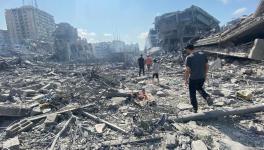Resistance Considers its Options: Limited Confrontation or Open War?
Israel’s Sunday air strikes on military targets in Damascus has led to much speculation about the motives behind the attack and whether Syria – or its Iranian or Hezbollah allies – will respond in kind.
Many pro-regime voices called for an immediate Syrian response, but others in the opposition welcomed the operation as a humiliating blow to Damascus.
What Happened?
Four years ago, Israel adjusted its military posture toward the forces of resistance in the region by deciding that it will do all it can to prevent strategic, game-changing weapons from reaching Hezbollah in Lebanon.
Over the years, these weapons changed. At one point the Israelis talked about the Russian S-300 anti-aircraft missile system, then the focus shifted to long-range missiles with heavy payloads, or the more precise Iranian Fateh-110 missile. The most recent addition is chemical weapons.
The Israelis warned Damascus repeatedly through various diplomatic and security channels to stop providing such weapons to the Lebanese Resistance. On a number of occasions, Tel Aviv sent information to a number of Arab and Western capitals, including pictures and documents, about Hezbollah-run missile factories inside Syria.
Despite repeated threats that included overflights and mock strikes along the Lebanese-Syrian border, the Zionist authorities did not dare carry out a direct attack on any of these facilities or Hezbollah’s many missile storage sites in Lebanon. And when Israeli generals tried to get permission for such an operation, politicians would always counter that this is not the time to enter into a confrontation with Lebanon.
What has changed over the past two years is Syria. The crisis erupted and drew in just about every major power in the world hijacking legitimate popular demands each for their own reasons.
Israel calculated that based on these developments – as they are not prepared for a major confrontation with Hezbollah and attacking Iran is becoming a distant dream – it is a good opportunity to change the rules of the game on its northern front with Syria.
The first step in this direction came with the January 30 attack on the Jurmana research facility near Damascus, a site widely known to have been set up to serve the military needs of the resistance movements in Lebanon and Palestine. Sunday’s strike represents an escalation in this policy as it targeted areas related to the Syrian armed forces that also contained storage facilities for Iranian weapons destined for Hezbollah.
The target was, nevertheless, carefully selected so as not provoke a strong response from the other side. No Israeli official in their right mind believes that such a strike represents more than a small dent in Hezbollah’s arsenal, most of which is already in Lebanon.
After the attack, Israel behaved like a criminal awaiting punishment, sending messages in all directions that it had no interest in a war. The Zionist security establishment is still busy trying figure out exactly what the other side intends to do.
The Israelis have, however, calculated correctly that the other side is not in a position to open another front in addition to the global campaign being waged against them in Syria. This only confirms that Israel’s objective is not to spark another war but simply to take advantage of an opportunity to change the rules of engagement with its opponents.
The Coming War
Iran and Hezbollah may not be under any pressure to respond to Israel’s strike, but certainly many of Assad’s supporters are asking: why not reply?
The following considerations have to be taken into account:
1) The nature of the attack has put Hezbollah, Iran, and Syria in the same boat and therefore any decision to respond can only arise from an understanding after discussions among all three parties.
2) Syria and its allies understand that the priority today is the internal front. As long as Iran and Hezbollah are accusing the armed opposition of being in the Israeli camp, a blow to them is tantamount to a blow to the Zionists behind them.
3) Israel is not stupid enough to believe that such one-off strikes are enough to change the rules of engagement. A change of this sort requires more protracted confrontations like the ones that took place between the Resistance in Lebanon and Israel in the 1990s, which could easily spark a wider war, the extent of which no one can accurately predict.
Given these circumstance, we can conclude the following:
- Those who want an immediate response should look in the direction of Iran and Hezbollah. There are enough indicators on that front to suggest that there is no escaping some kind of reply.
- Whoever was hoping that the Israeli strikes would tip the balance in favor of the opposition should await the results of the coming battles, which promise to be more ferocious than the ones we’ve seen over the past four months.
- There are a growing number of developments that increasingly suggest that a wider war is on the horizon, the nature and timing of which depend on many factors.
Finally, it is important to point out that events in Syria no longer have any relation to something called a revolution; it is an armed insurgency by forces opposed to the Syrian state and all that it stands for. It is an act of great stupidity.
Courtesy: Alakhbar English
Disclaimer: The views expressed here are the author's personal views, and do not necessarily represent the views of Newsclick
Get the latest reports & analysis with people's perspective on Protests, movements & deep analytical videos, discussions of the current affairs in your Telegram app. Subscribe to NewsClick's Telegram channel & get Real-Time updates on stories, as they get published on our website.
























